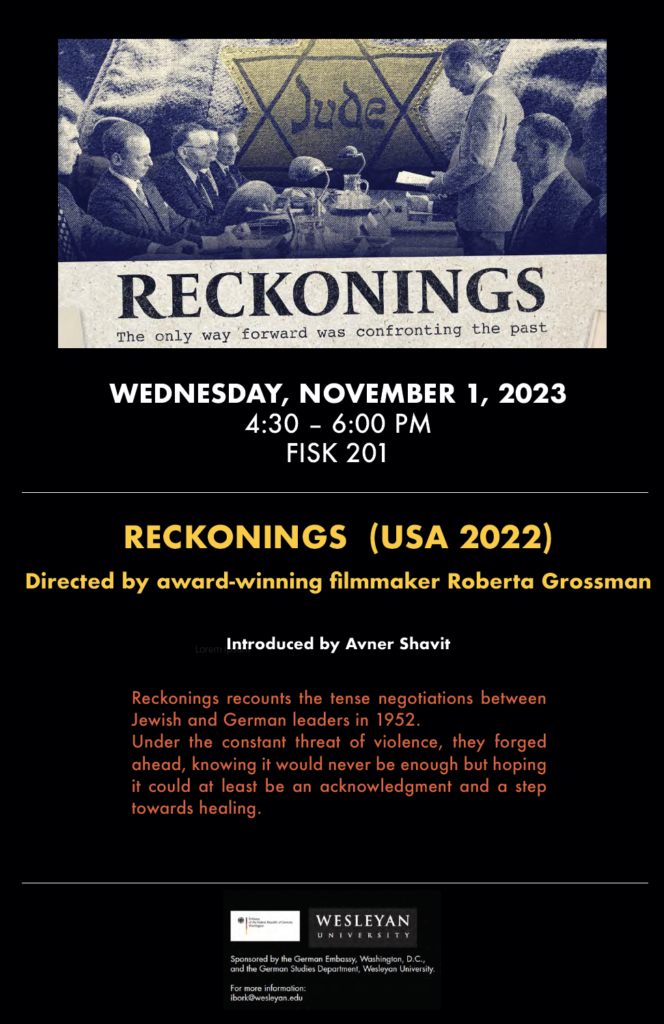
For more information please click HERE.

For more information please click HERE.

Roman Utkin: “Sergey Nabokov, 1900–1945: A Russian Émigré in the Concentration Camp Neuengamme”
Kristina Vagt (Foundation of Hamburg Memorials and Learning Centers/denk.mal Hannoverscher Bahnhof) “Places of Terror and Remembrance: Neuengamme and Hannoverscher Bahnhof in Hamburg”
Erik Grimmer-Solem “War Crimes, Military Tradition, and Public History: The Case of General Sponeck.”
Introduced and moderated by Iris Bork-Goldfield
Roman Utkin will talk about Sergey Nabokov. While the writer Vladimir Nabokov plays a central role in Russian cultural history, the Russian émigré Sergey Nabokov is merely a footnote to that history: a famous writer’s gay brother. Three facts of Sergey’s biography are invoked whenever his name is mentioned: he was gay, he had a bad stammer, and he died in a Nazi concentration camp in 1945. In the 1930s, Sergey lived with his life partner, Hermann Thieme, in Austria, where both were charged with violations of Paragraph 175 and imprisoned following the Anschluss. Hermann was sent to a penal colony in Africa. Sergey was initially released but then rearrested in Berlin in 1944 and ended his days in the concentration camp Neuengamme. The reconstruction of Sergey’s biography offers an invaluable glimpse into conceptions of a queer exile in interwar and wartime Europe.
Kristina Vagt will talk about the concentration camp in Neuengamme, a suburb of Hamburg, which—in the early summer of 1940—became the main concentration camp in northwest Germany until 1945. For many decades, Neuengamme faded from public memory. The Neuengamme Concentration Camp Memorial was inaugurated in May 2005 on the 60th anniversary of the camp’s liberation. Today, the Memorial encompasses virtually the entire grounds and 17 original buildings of the former concentration camp. Measuring about 141 acres (57 hectares), it is one of the largest memorials in Germany. It is a site for remembering and learning that preserves the memory of the victims of SS terror while also providing opportunities to explore the causes and consequences of the Nazi regime. In addition, Kristina will introduce the audience to Denkmal Hannoversche Bahnhof, the place from which Jews, Sinti, and Roma in Hamburg were deported to Auschwitz, Riga, Theresienstadt, and other concentration camps.
Erik Grimmer-Solem will be talking about General Hans von Sponeck and the memorials that were dedicated to him in Cold War West Germany. Long associated with the military resistance to Hitler because of his court martial in 1942 and execution by the SS in July 1944, von Sponeck is the subject of Prof. Grimmer-Solem’s historical research revealing involvement in significant war crimes and crimes against humanity during the invasion of the Soviet Union in 1942. These findings were published in the Militärgeschichtliche Zeitschrift and discussed extensively in the German news media and in the Bundestag in 2014-15. As a result, the “General-Hans-Graf-Sponeck-Kaserne” in Germersheim was formally renamed “Südpfalz-Kaserne,” and memorials to the general in Germersheim and Bremen were changed or removed. This episode raises important questions about the relationship between history and public monuments as well as the problem of what to do with monuments that are incomplete, misleading or inaccurate.
Associated Professor Kohei Saito ’09 teaches philosophy at Tokyo University. He received his BA from Wesleyan University where he also studied German. He did his PhD in philosophy at Humboldt Universität in Berlin, Germany. His Karl Marx’s Ecosocialism: Capital, Nature and the Unfinished Critique of Political Economy (New York: Monthly Review Press, 2017) was awarded the most prestigious academic award for Marxian studies, the Isaac Deutscher Memorial Prize, in 2018. This makes him the youngest recipient of that honor. The book has been published in eight languages.
Saito’s “Capital” in the Anthropocene (Tokyo: Shueisha, 2020) opened up a pathbreaking interpretation of Marx’s theory of postcapitalism in the age of climate crisis, selling 500,000 copies in Japan. His introduction to Marx’s Capital that was utilized as a textbook for a TV program on the NHK network has sold more than 100,000 copies to date.
Capital in the Anthropocene received “Best Asian Books of the Year” from the Asia Book Awards 2021 Committee.
His book was recently also reviewed in the German newspaper Süddeutsche Zeitung.
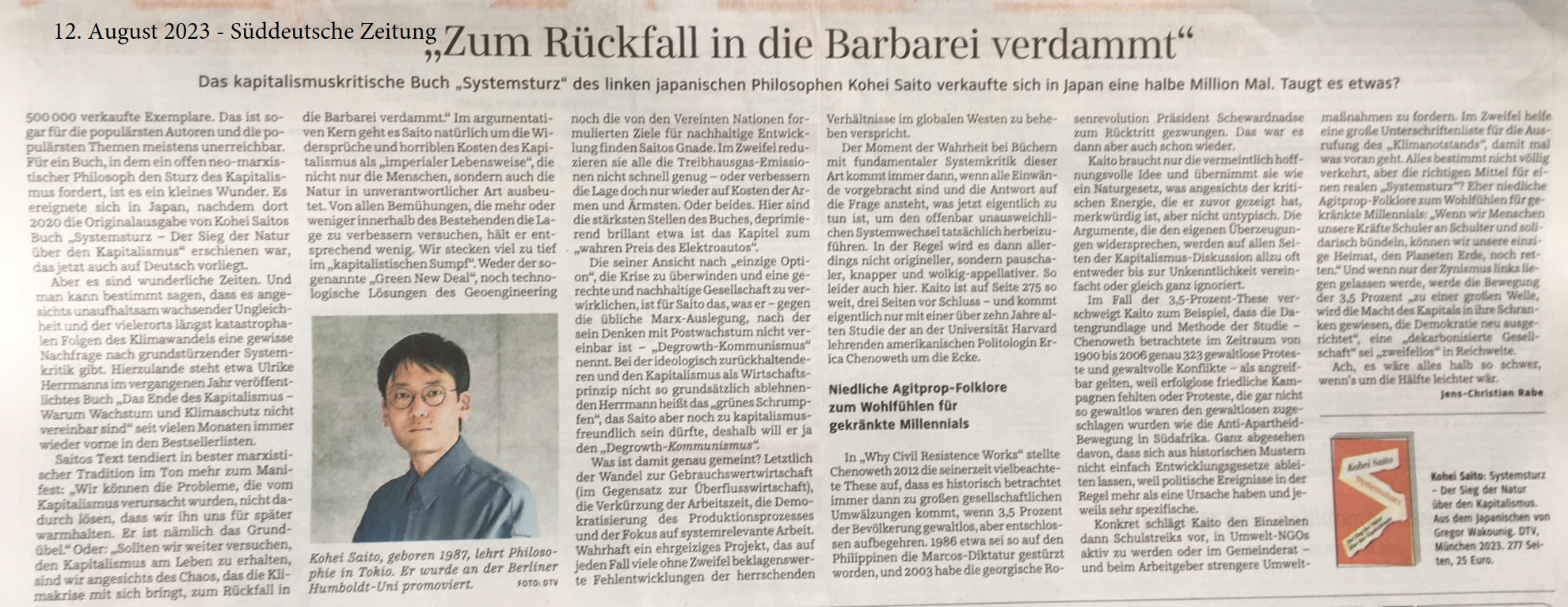
On September 5th, 2023 the NYT published the following article by Ben Dooley and Hisako Ueno.
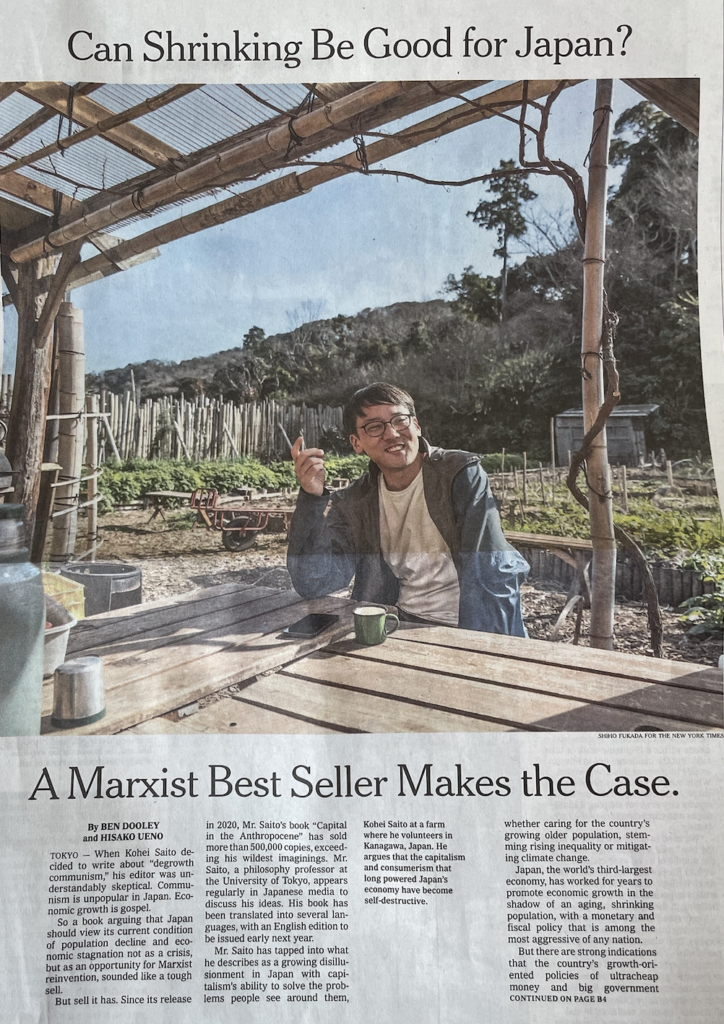
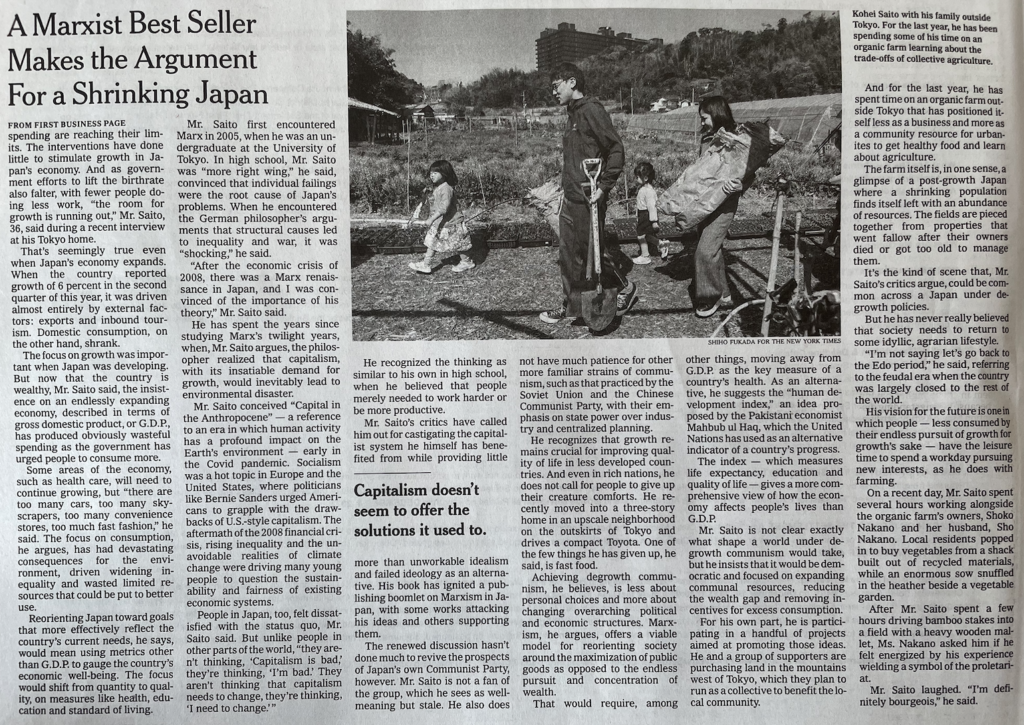
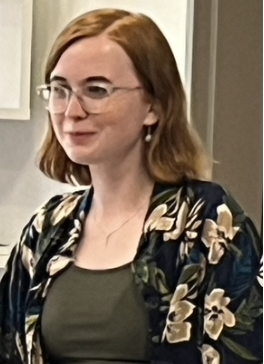
Anna Tjeltveit ‘23
In May, Anna graduated with a degree in English and German Studies. She received high honors for her joint thesis, which is a novella about environmental destruction in East Germany, titled “Our Future Has Already Begun.” This summer, Anna is teaching Norwegian at Concordia Language Villages, the summer camp program where she has been teaching German for the last few summers. After the summer ends, Anna will be moving to Bremen, Germany, to take a Fulbright English Teaching Assistantship. She can’t wait for her Fulbright year to start and to see what the rest of the future holds!
Linus Mao ’23
After finishing up a busy senior year at Wesleyan as a COL and GRST major, during which Linus was awarded a DAAD master’s stipendium for Media Studies in Germany and wrote an Honors Thesis titled “‘Tiger’s Leap into the Past’: Cinema, Auteurs, and Time in Fassbinder and Godard,” they will spend their two-month summer break back at home with their family in Shanghai, China. Linus plans to mostly study German, read books and watch films in preparation for doctoral work in German studies at UC Berkeley starting this Fall. Currently, Linus’ project seems to have taken an unexpected Russian turn, as they are watching films directed by Kirill Serebrennikov and enjoying books by Vladimir Nabokov. Linus does hope that this small detour will eventually contribute to their research of German author W.G. Sebald, which Linus is determined to continue in their graduate studies
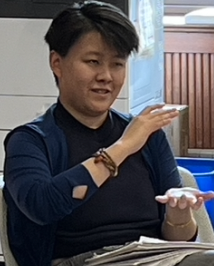
Miles Cohen ’23
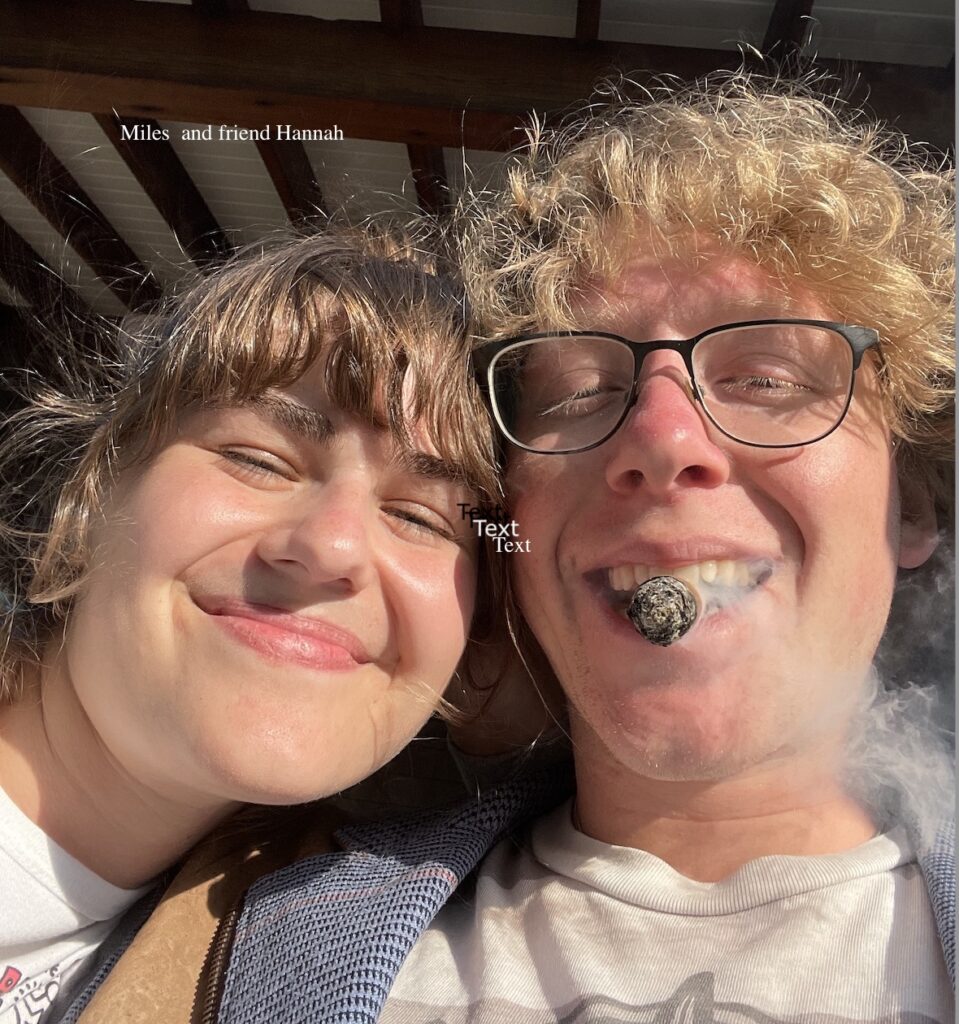
Miles left Wesleyan with a triple major in Government, COL, and GRST. He wrote the following to Professor Bork about his summer plan: “I was very happy to graduate Wesleyan as a triple major in the College of Letters, German Studies, and Government. I received High Honors in the COL and German Studies and Honors in Government. I wrote a senior thesis titled ‘Symbols of Hate: The History of White Supremacy Through Symbolic Representation’ and was awarded the White Fellowship from the Government Department and the Blankenagel Prize from the German Studies Department. I am currently living in Washington D.C. and working as a Research Analyst intern for the political and economic development firm Just Results. After the summer I will either stay in D.C. or move to New York City with some lovely friends, I have yet to decide. However, the future is bright! Huzzah!”
The honors theses will become available on Wesleyan’s website Digital Collection.
Yasemin Schmitt ‘24
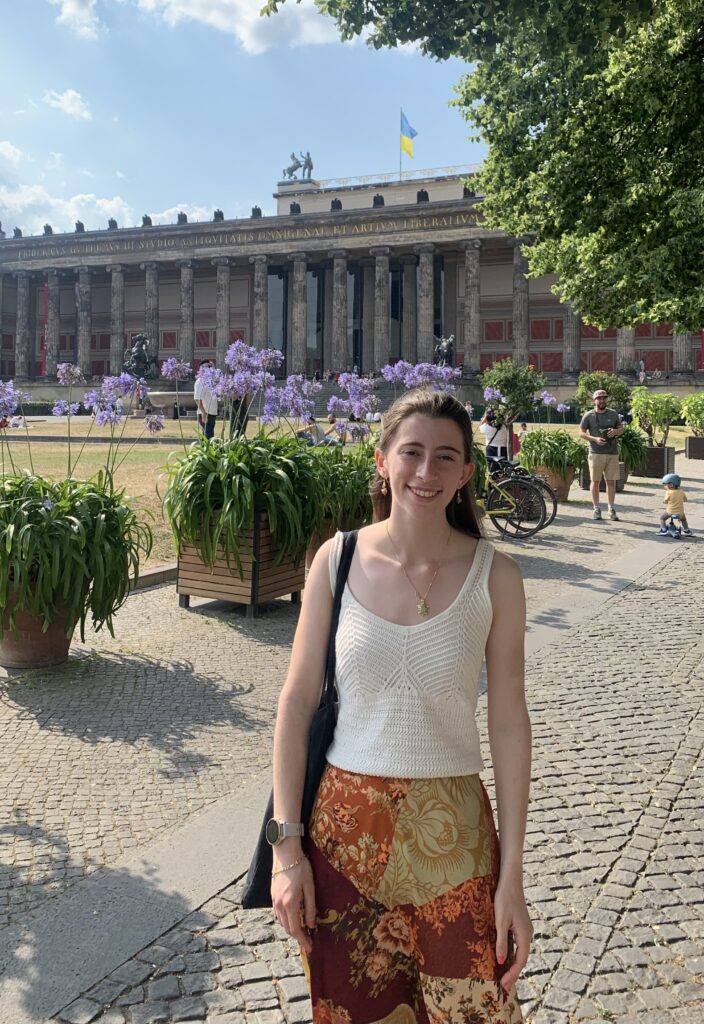
This summer, Yasemin will be attending a six-week-long study abroad program in Berlin at Freie Universität through FUBiS. She will be taking an intensive advanced German language class. Through her course and personal excursions, she is excited to be learning about Berlin’s history and what daily life is like. Yasemin is also planning to travel to southern Germany and Turkey until the end of July to see relatives. Upon her return, Yasemin will spend time with family and friends and get ready for the fall semester.
On June 14th, I received the following email and photos from Yasemin and Spencer Klink ‘25 , who are both studying in Berlin:
Liebe Frau Bork,
es ist wirklich toll, dass ich in Berlin wohne und studiere. (…) Ich finde die Stadt so schön und man kann hier so viel tun. Es ist schwierig Berlin zu beschreiben, weil jeder Ort anders ist. Der Sprachkurs ist auch toll und ich habe viel Übung beim Lesen, Sprechen und Hören. Ich habe das Gefühl, dass ich nach nur einer Woche freier sprechen kann. Ich mache wenige Pausen und Fehler und kann auch schnelles Deutsch besser verstehen. Gestern habe ich ein Referat über Gedächtnisforschung ohne Notizen gegeben. Jeden Tag lerne ich so vielen Wörter und auch verschiedenen Arten von Sprachen.
Dieses Wochenende haben Spencer und ich Sarah und Elia gesehen. Wir sind zum Prenzlauer Berg und Mauerpark gegangen und haben zusammen deutsches Frühstück gegessen. Gestern haben wir uns für das Abendessen getroffen und gehen in ein Freiluftkino in der Stadt. Am Freitag fahre ich mit der Zug nach Heidelberg, um Lena zu besuchen.”
Morgan Shaw ‘25
This summer Morgan will be staying in his hometown, Chattanooga, Tennessee, waiting tables.
Daniel Holt ‘25
In late May and early June, Daniel worked as Professor Bork’s research assistant and translated a film script of the documentary by Tilman Bünz, Der SS-Mann und das Mädchen. Der Aufstand im Warschauer Ghetto 1943. (The SS Man and the Girl. The Warsaw Ghetto Uprising 1943.) The documentary aired on Germany’s TV station ARD in early May and will be made available with English subtitles to the Wesleyan community in the fall.
This summer, Daniel will also be working at a summer day camp before returning to Wesleyan.
Wesleyan is celebrating Asian American and Pacific Islander Heritage Month in April, so come and join us this Wednesday, April 26 at 6pm in Fisk 413 for the last screening of our “Asian German FilmSeries” and pizza!
We’ll be showing some episodes of the 2022 TV series Doppelhaushälfte (Semi-Detached), with Iranian and Vietnamese diasporic characters in the main cast.
The Kröger-Sawadi family from hip Berlin has just settled down in a suburban duplex home, right next door to the Knuppes. Their idyllic house in the countryside may not be what they imagined… Come see how the neighbors get along in this fresh and subversive take on the German “culture-clash comedy”!
